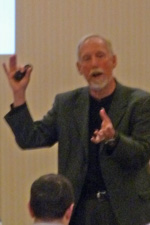Second address of keynote speaker: Change is difficult

The Rev. Chris Nelson began the second part of his talk by explaining that change is difficult. He said he didn’t intend to force it upon anybody present but just to present the possibilities for change. He said the status quo is the status quo because it works for the people in power.
He provided some context for congregations among the larger community.
He talked about how difficult change is for people in various circumstances – for health, for addiction, etc. However, he said, “I absolutely believe in a God of transformation,” and “I do believe with all my heart that Jesus changes people for the better, and that can be used to change their churches.”
Some points he made:
• Successful adaptive changes build on the past rather than jettison it.
• Organizational adaptation occurs through experimentation. (You don’t need to call it “failure.”)
• Adaptation relies on diversity.
• New adaptation significantly displace, reregulate and rearrange some old DNA. (Learning can be painful.)
It’s helpful to distinguish technical problems from adaptive challenges, he said. It’s not always easy to make this distinction. You may miss the kind of change you’re dealing with. Leading means messing with people’s comfort zones.
Refusing to risk is unfaithful:
• We can be risk takers or
• We can be care takers or
• We can be undertakers.
The faith we have gives us the strength for change. It comes from God.
There will be resistance to change – the heat will rise.
The adaptive leadership process is a cycle of observe and interpret and intervene.
(Many of the PowerPoint slides that Pastor Nelson showed, points he made and concepts he drew from came from the research of Heifez, R., Grashow, A. and Linsky M. [2009] The Practice of Adaptive Leadership.)




